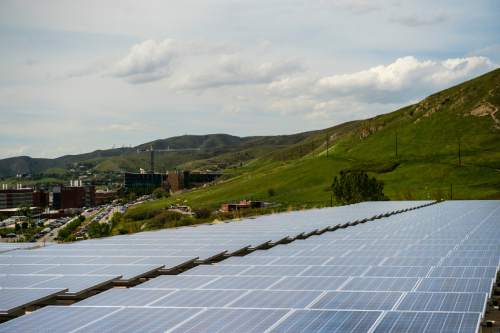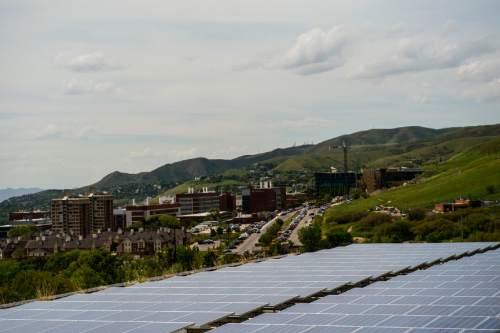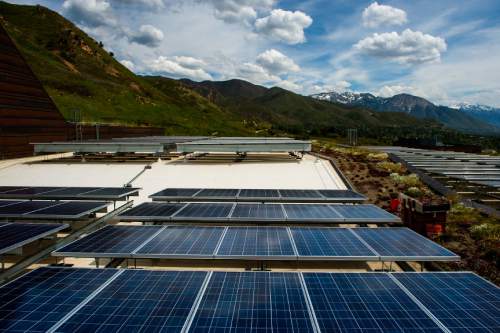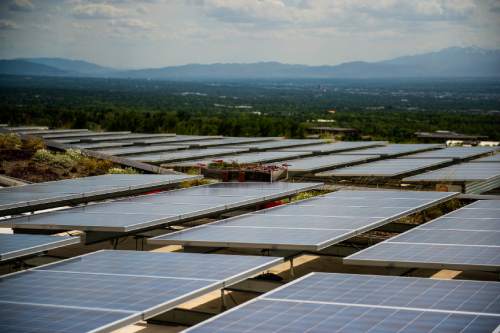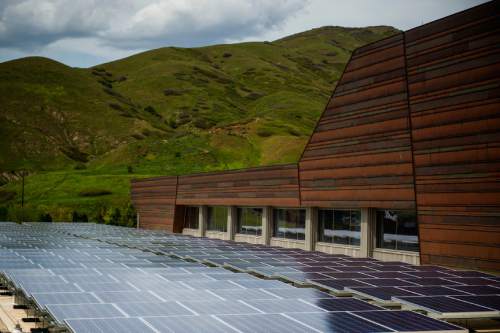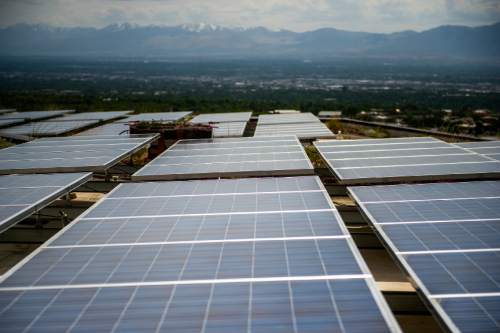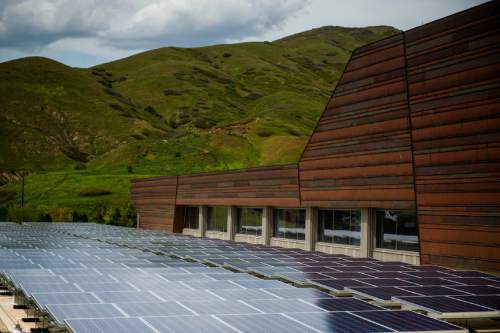This is an archived article that was published on sltrib.com in 2015, and information in the article may be outdated. It is provided only for personal research purposes and may not be reprinted.
As Utah's fight over solar-paneled homes enters a second round, state utility regulators are trying to identify the renewable power's benefits and the appropriate way to measure them.
Now some Salt Lake City students are weighing in with a petition asking the Utah Public Service Commission (PSC) to protect Rocky Mountain Power customers who harvest sunbeams from the utility company's plan to impose new fees on them.
"Solar power not only reduces strain on the grid by producing clean electricity on sunny days, [it] also lessens the need to make costly investments in new power plants," a petition drafted by Rowland Hall senior Claire Wang states.
"Because of Rocky Mountain Power's monopoly status and its guaranteed profits, the company ordinarily has little incentive to innovate or cut costs," the student petition continues. "The growth of solar use provides an excellent opportunity for the company to improve its internal efficiency and subsequently offer cheaper electricity for Utah residents."
Wang and other students rallied Tuesday at their private east-side school, which is equipped with solar arrays, to insist state officials take a broader view of solar's benefits.
Fueled in equal measures by technological innovation and financial incentives, roof-mounted photovoltaic arrays are proliferating at near-exponential rates in the sunny Southwest.
Residential power generation has become so widespread that utilities in Utah and other states say such customers are unfairly off-loading their share of maintaining the power grid. Utah's largest utility wants state permission to impose a monthly surcharge on solar-equipped customers who exchange their excess power for credits to draw power when the sun isn't shining.
The practice, known as net-metering, is mandated in 44 states and is now used by 644,000 homes, including about 3,000 in Utah.
Commission members rejected Rocky Mountain Power's proposed solar fee last August. But the new round of hearings still could result in a surcharge for solar users.
Clean energy advocates say the utility's position ignores key benefits of "distributed" power generation, not just to the utility, but to the planet.
The company, meanwhile, has filed a brief with the commission arguing Utah law does not require consideration of larger environmental benefits — just solar's boost to the power grid and utility customers.
Utah lawmakers adopted SB208 during their last legislative session. The bill directs the cost-benefit analysis now underway.
"It is clear that the statute excludes consideration of external benefits such as global health, social and environmental benefits that could theoretically be bolstered by net metering, but that are not directly enjoyed by the company or its customers. Similarly, the statute excludes from consideration benefits that are not quantifiable," wrote Rocky Mountain Power attorney Yvonne Hogle. "This interpretation is entirely consistent with how the commission has historically addressed benefits in the rate-setting context."
Tuesday's school rally coincided with the second in a series of technical conferences the commission is hosting to help it gauge the benefits of net-metered power generation.
"From cleaner skies to more local jobs to increased consumer choice, solar energy is a boon to Utah," Democratic Salt Lake City Sen. Luz Escamilla told students.
For the PSC, unresolved questions focus on who benefits from solar — rate payers or society as a whole — and how particular benefits — like reduced wear on transmission infrastructure or avoided costs — can be measured.
The commission is scheduled to hold a three-day public hearing starting Oct. 6 to answer those questions and possibly set a monthly surcharge.
Net metering does not fit well with Utah's electrical system, which is designed around generation at centralized plants and long-distance transmission, according to Rocky Mountain Power spokesman David Eskelsen. It requires the utility to purchase power from net-metered customers at retail rates, though the solar power is not worth that much to the company.
The current electric rate structure "has energy, transmission, distribution and administration leveled into the kilowatt charge," Eskelsen said. "Net-metered customers are using their service in a vastly different way. It is appropriate that there is now a different pricing structure for them."
Utility executives say clean energy advocates are overestimating the ability of solar, an intermittent fuel source, to offset the need to invest in fossil fuel-fired plants.
Multiple stakeholders are participating in Utah's cost-benefit debate.
The PSC has granted intervenor status not just to clean energy advocates and solar trade groups, but also to Salt Lake City and the Utah Association of Energy Users, a collection of organizations with industrial-strength power bills.
"We believe all the cards should be on the table," said Stan Holmes, a Salt Lake City net-metered customer, arguing at Tuesday's conference as a representative of UCARE, or Utah Citizens Advocating Renewable Energy. "Let's look at all the factors, including societal factors, and decide which ones should be internalized into the rate structure."
Holmes proposed the PSC examine how rooftop solar could reduce water consumption associated with traditional power generation; soften impacts to water quality and landscapes, particularly by reducing coal mining and the volumes of coal ash pouring out of power plants in the state; and help get Utah's air quality in compliance with federal thresholds for regional haze, ozone and particulate pollution.
Such benefits both protect the environment and bolster the power company's bottom line, he said.
Nearly 200 Rowland Hall students signed the petition demanding greater weight be given to the upsides of decoupling the grid from coal, the fossil fuel that plays in disproportionate role in climate change and air pollution.
"My generation doesn't want to keep relying on outdated, polluting coal," Wang said. "Rooftop solar provides us with cleaner air, healthier communities and the ability to make our own energy choices."
The Rowland Hall petition argued Rocky Mountain Power's proposed fee would discourage future growth in solar, pointing to a 40 percent dip in new installations last year in Arizona after state leaders there signed off on a surcharge for net-metered utility customers.
"As I did more research, I realized this is an issue everyone has to be involved in. Progress isn't happening as fast as we would like," Wang said. "This is a decision that will set a precedent for future energy policy."


